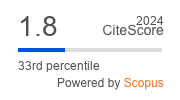Gift Recommendations Based on Personality Using Fuzzy and Big Five Personality Test
Abstract
Gifts are usually given to someone to strengthen a relationship or to motivate someone. However, givers often need help determining the appropriate gift for the potential recipient. On the other hand, many recipients are disappointed with the gifts received. This event can result in the relationship between the giver and recipient being disrupted or the motivational goal not being achieved. This research aims to develop a system to recommend gifts based on the recipient's personality. Gift recommendation is determined based on the recipient's personality because the recipient highly values gifts that match the recipient's personality. The system is built using the Fuzzy method, and the personality measurement tool used is the Big Five Personality Test. Fifteen pairs of respondents validated the system. The validation results show that 80% of respondents as gift-givers strongly agree that the system helps determine the appropriate gift for someone. In addition, 73.33% of respondents as gift recipients strongly agree that the gifts recommended by the system do not disappoint them.
Downloads
References
I. Tanjung, “Pemberian Hadiah kepada Pegawai: Tinjauan Hukum Islam dan Undang-Undang Republik Indonesia Nomor 20 Tahun 2001,” AT-TAFAHUM J. Islam. Law, vol. 1, no. 2, pp. 72–85, 2017.
D. Kong, Y. Wang, and J. Zhang, “Efficiency wages as gift exchange: Evidence from corporate innovation in China,” J. Corp. Financ., vol. 65, 101725, Dec. 2020, doi: 10.1016/j.jcorpfin.2020.101725.
R. Aziba-Anyam Gift and F. Obindah, “Examining the influence of motivation on organizational productivity in Bayelsa state private hospitals,” Open Access J. Sci., vol. 4, no. 3, p. 94‒108, 2020, doi: 10.15406/oajs.2020.04.00157.
S. Sinaga, “Peranan Balas Jasa dan Insentif terhadap Motivasi Kerja pada PT. Sony Gemerlang Medan,” J. Darma Agung, vol. 28, no. 1, pp. 132–144, 2020, doi: http://dx.doi.org/10.46930/ojsuda.v28i1.605.
D. Aprilianti, M. Novia Herawati, H. Isnaini, and I. Siliwangi, “Pengaruh Pemberian Hadiah terhadap Minat Siswa dalam Menulis Teks Cerpen pada Siswa SMP,” Parol. (Jurnal Pendidik. Bhs. dan Sastra Indones., vol. 2, no. 3, pp. 427–432, 2019, doi: http://dx.doi.org/10.22460/p.v2i3p427-432.2836.
U. Kusyairy, S. Fakultas Tarbiyah, D. Keguruan, and A. Makassar, “Meningkatkan Hasil Belajar Peserta Didik melalui Pemberian Reward and Punishment,” J. Pendidik. Fis., vol. 6, no. 2, pp. 81–88, 2018, doi: https://doi.org/10.24252/jpf.v6i2.5595.
NN, “Arti Kata ‘hadiah’ Menurut KBBI,” KBBI.co.id, 2015. https://kbbi.co.id/arti-kata/hadiah.
I. Branco-Illodo and T. Heath, “The ‘perfect gift’ and the ‘best gift ever’: An integrative framework for truly special gifts,” J. Bus. Res., vol. 120, pp. 418–424, Nov. 2020, doi: 10.1016/j.jbusres.2019.11.012.
A. P. Anggraini, “Tak Suka dengan Kado yang Didapatkan? Lakukan Ini,” Kompas.com, 2017. https://lifestyle.kompas.com/read/2017/12/24/100821820/tak-suka-dengan-kado-yang-didapatkan-lakukan-ini.
J. Galak, J. Givi, and E. F. Williams, “Why Certain Gifts Are Great to Give but Not to Get: A Framework for Understanding Errors in Gift Giving,” Curr. Dir. Psychol. Sci., vol. 25, no. 6, pp. 380–385, Dec. 2016, doi: 10.1177/0963721416656937.
T. Wen, “Tips memilih hadiah yang tepat bagi orang terdekat menurut peneliti,” BBC News Indonesia, 2019. https://www.bbc.com/indonesia/vert-cap-50818002.
M. Pizzetti, “Gifts , emotions and cognitive processes : An inquiry of gift receiving from a consumer psychology perspective,” 2016.
C. de Paula Pereira, R. Parente da Costa, and E. Dias Canedo, “Mobile Gift Recommendation Framework A COREL Framework Approach,” in 20th International Conference on Enterprise Information Systems (ICEIS), 2018, pp. 657–663, doi: 10.5220/0006792806570663.
T. Shruti, Y. Krushna, and K. Pavan, “Gift-Me : Personalized Gift Recommender System,” J. Int. Ser. Interdiscip. Sci. Technol., vol. 3, no. 1, pp. 143–148, Apr. 2018, doi: 10.23960/ins.v3i1.143.
M. T. Adiman and R. G. Guntara, “Pembangunan Aplikasi Kadoku Pencarian Rekomendasi Hadiah Pemberian Berbasis Android,” Universitas Komputer Indonesia, 2018.
F. Mar’i, W. Firdaus Mahmudy, and C. Yusainy, “Sistem Rekomendasi Profesi Berdasarkan Dimensi Big Five Personality Menggunakan Fuzzy Inference System Tsukamoto,” J. Teknol. Inf. dan Ilmu Komput., vol. 6, no. 5, pp. 457–466, 2019, doi: 10.25126/jtiik.20196942.
Copyright (c) 2022 Jurnal RESTI (Rekayasa Sistem dan Teknologi Informasi)

This work is licensed under a Creative Commons Attribution 4.0 International License.
Copyright in each article belongs to the author
- The author acknowledges that the RESTI Journal (System Engineering and Information Technology) is the first publisher to publish with a license Creative Commons Attribution 4.0 International License.
- Authors can enter writing separately, arrange the non-exclusive distribution of manuscripts that have been published in this journal into other versions (eg sent to the author's institutional repository, publication in a book, etc.), by acknowledging that the manuscript has been published for the first time in the RESTI (Rekayasa Sistem dan Teknologi Informasi) journal ;








